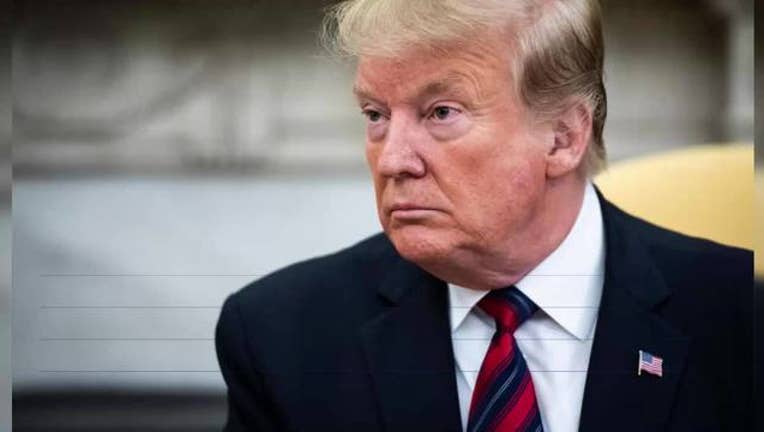White House orders ex-counsel McGahn to defy House subpoena

WASHINGTON (AP) - The Trump administration has instructed former White House counsel Don McGahn to defy a subpoena for documents from the House Judiciary Committee, arguing that the materials are subject to executive privilege.
The committee wants to speak to McGahn and review certain documents after he cooperated extensively with special counsel Robert Mueller's investigation into Russian election interference and whether President Donald Trump obstructed justice.
In a letter to House Judiciary Committee Chairman Jerrold Nadler on Tuesday, the deadline the panel set for the materials, White House Counsel Pat Cipollone said McGahn has been directed not to disclose the documents. Cipollone said McGahn does not have any "legal right" to the materials because they are under White House control and that any requests should be directed to the White House.
Meanwhile, Senate Majority Leader Mitch McConnell on the Senate floor declared "case closed" on the Russia probe and potential obstruction by Trump, deriding Democrats who he says are "grieving" the result.
"It's finally over," the Republican leader said, in his most significant comments yet on the investigation. The Kentucky Republican called Mueller's findings "bad news for the outrage industrial complex but good news for the rest of the country."
RELATED COVERAGE:
- Key takeaways from Robert Mueller's Russia report
- Mueller reveals Trump's attempts to choke off Russia probe
- Ex-prosecutors: Trump would face obstruction charges if not president
House Speaker Nancy Pelosi disputed McConnell, saying "that's just not a fact - the case is not closed." And Senate Democratic Leader Chuck Schumer in his own speech called McConnell's words an "astounding bit of whitewashing." He challenged the GOP leader to move legislation that would improve election security and be tougher on Russian sanctions.
"What we have here is a concerted effort to circle the wagons, to protect the president from accountability," Schumer said.
Besides documents, the House Judiciary committee's subpoena also asks McGahn to testify later this month. Trump has signaled he will try to block McGahn from appearing. McGahn's lawyer said that he will "maintain the status quo" and wait for the White House and the committee to reach an agreement.
"As you will appreciate, Mr. McGahn, as a former assistant to the president and the most senior attorney for the president in his official capacity, continues to owe certain duties and obligations to the President which he is not free to disregard," wrote attorney William Burck.
The dispute with the White House comes as the committee is also negotiating with the Justice Department over obtaining a full, unredacted version of Mueller's report. Attorney General William Barr released a redacted version to the public last month, but Democrats want to see the full document, plus underlying documents, and have scheduled a committee vote Wednesday to hold Barr in contempt for not providing it.
House Judiciary Committee staff are to meet with Justice Department officials Tuesday for final negotiations before the contempt vote. Nadler said late Monday that he hopes to make "concrete progress" toward resolving the dispute over gaining access to the report.
Democrats accuse Barr of spinning the results of Mueller's investigation to Trump's benefit. Barr, in a memo summarizing Mueller's investigation, said there was insufficient evidence that Trump obstructed justice, a conclusion Democrats fiercely dispute.
Nadler said the version of Mueller's report that has already been released to the public offered "disturbing evidence and analysis that President Trump engaged in obstruction of justice at the highest levels." Now, he said, lawmakers need the full version and the underlying evidence "to determine how to best move forward with oversight, legislation and other constitutional responsibilities."
Justice Department spokeswoman Kerri Kupec said that the department has "taken extraordinary steps to accommodate the House Judiciary Committee's requests for information" regarding Mueller's report but that Nadler had not reciprocated. She noted that Democrats have refused to read a version of Mueller's report with fewer redactions that has already been provided to Congress.
If the committee approves the contempt resolution against Barr, it would head to the full House for final approval. But that step is unlikely to lead to criminal charges. A House vote would send a criminal referral to the U.S. attorney for the District of Columbia, a Justice Department official who is likely to defend the attorney general.
By pursuing contempt, Democrats hope to send a message to the Trump administration about their willingness to invoke congressional powers in the majority. Beyond Mueller's report, House Democrats have, mostly unsuccessfully, subpoenaed administration witnesses and made efforts to gain access to Trump's personal and business financial records. Trump has said he will block those efforts, declaring he will "fight all the subpoenas."
Democratic House leaders could file a civil lawsuit against the Justice Department to obtain the Mueller report, an option that could take months or even years to resolve. Some committee members have suggested they also could fine Barr as he withholds the information. They could also open impeachment proceedings against Trump, though Pelosi has said she's not interested in doing that, for now.
Republicans have lambasted the Democratic tactics as overreach. The top Republican on the Judiciary Committee, Rep. Doug Collins of Georgia, said "Democrats have launched a proxy war smearing the attorney general" when their anger actually lies with the president.
Mueller's report states that his investigation could not establish a criminal conspiracy between the Trump team and Russia. However, it did not reach a conclusion on whether Trump obstructed justice. Mueller didn't charge Trump but wrote that he couldn't exonerate him, either.
___
Associated Press writer Eric Tucker contributed to this report.

